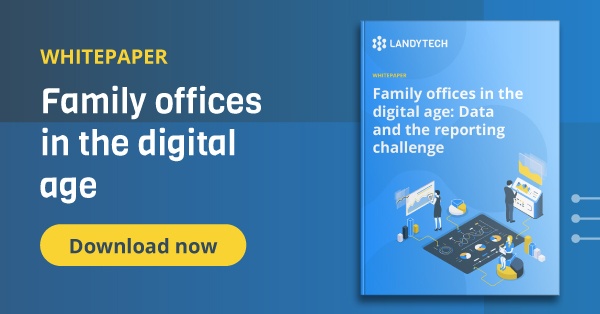Written by Landytech
13 Feb 2023A considerable proportion of global wealth is owned by individuals who are close to or older than 60 years old – it’s been estimated that more than US$30 trillion will be transferred from one generation to the next over the next few decades.
Most family office advisors have spent the majority of their careers providing investment and financial advice to affluent baby boomers. But an aging client base poses a considerable risk to the long-term viability of multi-family offices.
Intergenerational wealth transfer is one of the main causes of client attrition, as clients pass, and beneficiaries take their assets elsewhere. If multi-family offices don’t develop relationships with their clients’ heirs, the chances of retaining assets are low.
So, how can technology help multi-family offices to deepen relationships with future generations now to ensure their business is futureproofed for decades to come?
Form your retention strategy now
Many advisors within family offices are seasoned professionals who have developed a close relationship to the family heads over a considerable number of years. Through these relationships, an inherent trust and value are built up which are almost undoubtable to the family heads, but not necessarily to the next generation.
People want to invest with advisors they know and trust. This means that if family offices get to know and develop a relationship with heirs now, they are much better placed to gain their long-term loyalty, and for heirs to feel the same level of trust and value for the office felt by current family heads.
Forming a retention strategy that incorporates heirs is vital to building relationships with beneficiaries. For multi-family offices this means shifting from a one-to-one model, to a one-to many model, where they can act as a consultant to the wider family and not just the primary wealth creator.
Developing relationships with heirs also ensures they are part of the communication and planning process well in advance of any future wealth transfer, which will go a long way to instil trust and confidence. Establishing this relationship with inheritors now also allows family offices to lay a foundation of knowledge when it comes to investment and financial advice.
Make your family office indispensable
Forging the relationships now means that by the time the next generation to take the baton, the family offices’ services are already seen as indispensable. It’s made even more important given that studies over 70% of heirs don’t consider their parents’ wealth manger after receiving an inheritance.
Family offices should be prepared to treat the next generation as if they are clients whose business they’re trying to win. This means gaining a deep understanding of the areas of the business that interest them, and where their own values and financial objectives lie.
Building strategies that incorporate these views into the wider scope of what the family office is trying to achieve naturally builds engagement. Not only will an engaged, knowledgeable next generation aid smooth succession, but also help establish ties over successive branches of the family tree. Family offices who understand the needs, wants, and desires of the next generation can have a multi-generation relationship with their families.
Relationships with the next generation can be solidified by adopting digital tools and platforms. A system that can give proactive reminders to maintain communication with individuals, can ensure that heirs are kept up to date with the valuations and performance of any assets they have a stake in already.
Embracing digital solutions
Families already expect to have a rich timely flow of information at their fingertips. Gone are the days of monthly or quarterly reports and presenting reports that do not provide a complete view of performance and wealth.
The future generation are digital natives, and family offices must have a tech stack that provides the up-to-date information and instant communications they are accustomed to in all areas of life. Embracing digital solutions will not only ensure family offices are best placed to manage wealth transfers successfully, but also that they are futureproofed to manage family affairs in the tech-forward manner expected by the next generation.
Family offices should be developing or leveraging existing platforms, to offer the next generation ready access to their information. So they can learn more about investing, become familiar with wealth management platforms and maintain an open line of communication.
For family offices, digital platforms also provide insurance against document loss in the event of a sudden death. Families have all sorts of documents related to their investments and holdings that need to be kept safe for future access. These might be across statements, paper folders and spreadsheets. A digital solution ensures the latest versions of these documents can be easily stored and retrieved.
Incorporating more family members into the communication and reporting process will increase the workload of any family office, but technology is on hand to help. Technology can provide the flexibility needed to ensure family members receive information in their preferred channel, whether that be paper copies, email or natively in a wealth management platform.
Digital platforms also enable family offices to enhance the client experience and strengthen relationships, but also to serve clients more efficiently when it comes to reporting.
Planning for the future
Technology will play an important part in intergenerational wealth transfer for multi-family offices. It will pave the way for the relationships that need to be developed to retain the business of future generations, whilst proving now that the family office can manage their wealth for decades into the future.
Family offices that aren’t looking at the expectations of heirs now stand to lose the family relationships they’ve spent so long developing. But for those that act, the reward is a mitigation of risk and a much more future-proofed business capable of retaining the next generation of wealth owners.




